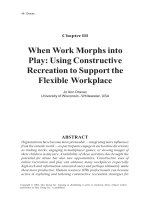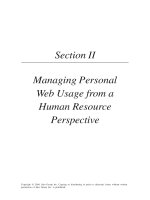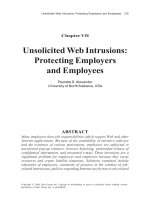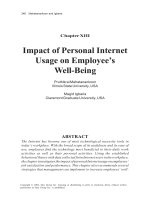Your Credit, Your Home, and Your Future: A Guide to Better Credit, Money Management, and Responsible Homeownership ppt
Bạn đang xem bản rút gọn của tài liệu. Xem và tải ngay bản đầy đủ của tài liệu tại đây (711.96 KB, 86 trang )
Your Credit, Your Home, and Your Future
A Guide to Better Credit, Money Management,
and Responsible Homeownership
i
Contents
Your Credit, Your Home, and Your Future 1
1) Your Credit and Why It Is Important 3
2) Managing Your Money 6
3) Goal Setting 16
4) Banking Services: An Important Step 18
5) Establishing and Maintaining Good Credit 27
6) Understanding Credit Scoring 36
7) Thinking Like a Lender 39
8) Avoiding Credit Traps 43
9) Restoring Your Credit 50
10) Planning for Your Future 53
11) Becoming a Homeowner 54
12) Preserving Homeownership: Protecting Your Home Investment 65
13) Glossary of Terms 73
Your Credit, Your Home,
and Your Future
37309_Text_AA2:0117 4/9/08 6:36 AM Page i
37309_Text_AA2:0117 4/9/08 6:36 AM Page ii
1
Your Credit, Your Home, and Your Future
If you’re like many individuals, you don’t fully appreciate how
essential good credit and money management are until you
need them.
Perhaps you’ve been renting an apartment for several years,
but now you’d like to buy a house. Maybe it’s just not worth
fixing your 10-year-old car, but you need a way to get to work
so you need a car loan—fast! Or suppose your house has a
damaged roof and the cost of repairs exceeds your savings.
To resolve emergency situations like these while continuing
to manage your existing financial obligations, you’ll need good
credit and good money management skills.
Good credit is the result of careful planning of your finances.
Your credit record affects everything from renting an apartment
to buying a home. Without good credit, it’s difficult to save
money, become a homeowner, and build financial security.
That’s why this guide is so essential; and that’s why
Freddie Mac, a company dedicated to opening doors to
homeownership for millions of families across the United
States, is bringing you this guide. Freddie Mac recognizes
how important it is for consumers to have the information
and the tools that will help them achieve their financial goals
and dreams, including the dream of homeownership.
It is our sincere hope that the valuable information contained
within will empower you to take immediate control of your
financial future. Remember, the decisions you make
today
will impact your financial future tomorrow and for years to
come. Use this guide to take that next step to achieve your
goals and build financial security.
Your Credit, Your Home,
and Your Future
An Abridged Version of CreditSmart
®
, a Guide to Better Credit,
Money Management, and Responsible Homeownership
Stay on Course
Good Credit Helps You
Achieve Your Short- and
Long-Term Goals
Short-Term Goals
❚
Renting a place to live.
❚
Opening a checking account
at a financial institution.
❚
Getting a new job (which
may require a credit check).
❚
Establishing utility services
in your name (e.g.: electricity,
heating, water, telephone, etc.).
❚
Making a major purchase,
such as a car or furniture.
❚
Keeping your other rates
low (such as auto and
homeowner’s insurance).
Long-Term Goals
❚
Renting a better dwelling
than the current one.
❚
Going back to school
or college.
❚
Saving more money.
❚
Buying a car.
❚
Buying a home of your own.
❚
Starting a business.
❚
Investing for your future.
37309_Text_AA2:0117 4/9/08 12:36 PM Page 1
37309_Text_AA2:0117 4/9/08 6:36 AM Page 2
Credit is the ability to borrow tomorrow’s money to pay
for something you get today, such as a home, furniture,
or car, under an agreement to pay it back. From the time
that you receive your goods to the time that you pay for
them, you owe a debt.
Credit is extended through several means, including credit
cards, personal loans, car loans, and home mortgages. You get credit based on how you have
managed your money and credit in the past.
Your Credit and
Why It Is Important
1
3
Your Credit and Why It Is Important
▲▲
Your Credit History
Your credit history shows how you’ve managed your finances
and repaid your debts over time. Your personal credit report—
a listing of the information in your credit history—begins the first
time you apply for credit. From that point on, each time you
apply for a credit card or loan, information is added to your
credit report.
The most important component of your credit report is
whether you make your payments on time.
Any time that
your credit report shows a late payment—30 days, 60 days, or
90 days—a “red flag” is raised and you may be denied credit
or pay more to get it.
Why a Good Credit History Is Important
A good credit history increases the confidence of those in a
position to loan you money, like lenders and creditors. When
they see that you have paid back your loan when and how you
agreed, lenders are more likely to extend credit again. You will
be seen as fulfilling your agreement. With good credit, you can
borrow for major expenses, such as a car, home, or education,
and you can borrow money at a lower cost.
Stay on Course
What Hurts Your
Credit History
The primary reason that people
do not maintain good credit is
because they are late with their
payments or they do not repay
their debts. The most common
causes of late payments and
inability to pay are:
❚
Limited income
❚
Emergencies and/or
medical bills
❚
Financial overextension
❚
Divorce or separation
❚
Loss of job
37309_Text_AA2:0117 4/9/08 6:37 AM Page 3
1
Your Credit and Why It Is Important
4
Generally speaking, the better your credit, the lower the cost of obtaining that
credit, usually in the form of interest rates and fees. That means, you’ll have more
available for savings and spending. Lenders will have more confidence in your
ability and commitment to repay the loan on time and in full.
Conversely, if your credit history is not strong, you’ll probably pay higher interest
rates and fees and have less money available for savings and spending. You could
end up being short on money and playing “catch-up,” juggling between payments
on several bills. Over time, higher rates and fees translate into the loss of literally
thousands of dollars of potential savings.
The rate you’ll pay on a loan is usually determined by your credit report and credit
score. (For more information on your credit score, see Lesson 6, Understanding
Credit Scoring.) Lenders typically make “A” loans for people with good to excellent
credit, or who have made payments as agreed for the last 24 months. These
loans generally have the lowest interest rate. Lenders make “B” or “C”—or
“subprime” loans—for people with past or current credit problems, such as late
payments. These loans usually carry higher interest rates.
For Example
If you have good credit: A $125,000 home mortgage at 7% for 30 years costs $831.63 per
month for principal and interest. After making all 360 of the payments (12 months times 30
years), the total paid is $299,386.12.
If your credit is impaired: A $125,000 home mortgage at 12% for 30 years costs $1,285.77
per month for principal and interest. After making all 360 of the payments (12 months times
30 years), the total paid is $462,875.66.
The difference: That’s a difference of $163,488.86 in additional interest you will pay over
the life of the 30-year mortgage if your credit is impaired and you’re charged a higher interest
rate on your mortgage.
37309_Text_AA2:0117 4/9/08 6:37 AM Page 4
5
How to Establish a Good Credit History
The key to establishing a good credit history is honoring your promise
to repay loans or credit cards as agreed—on time and in the amounts
scheduled.
Failure to do so will make it difficult and costly for you to
borrow money for the things that you need for yourself and
your family, including a home, an education, or medical care.
Even though your intentions may be good, events may occur—
such as medical emergencies or losing a job—that impact your
ability to repay your loans. That’s why it’s critical to set up and
contribute regularly to a savings plan. By doing this, you will
have funds available to honor your credit agreements in spite
of unforeseen challenges.
Remember that even if an emergency is the reason for your late
payment or delinquent account, it can be reported to the credit
reporting agency.
If you do not have credit, rarely borrow money, or use a credit
card, consider applying for one or two cards to establish some
credit. Shop around and review the interest rates and fees.
Use the credit cards carefully, paying off the debt each month.
You should also keep your overall debt at a reasonable level
relative to your income. Generally speaking, your expenses
should not exceed more than 20% of your take-home net pay,
excluding a house payment.
Your Credit and Why It Is Important
▲
Stay on Course
Tips for Maintaining
Good Credit
Before taking on additional
debt, ask yourself the following
questions:
❚
Do I really need this item
right now or can I wait?
❚
What is the true (total) cost
of using credit?
❚
How much is the monthly
payment and when is it due?
❚
How many months will I
have to make this payment?
❚
Can I afford the monthly
payments?
❚
What will happen if I don’t
make the payments on time?
Remember—credit is a privilege!
The ability to borrow money at
reasonable terms and rates cannot
be taken for granted or assumed.
37309_Text_AA2:0117 4/9/08 6:37 AM Page 5
Managing Your Money
6
2
If you want to be successful at managing your money, you’ll
need to understand the importance of budgeting, spending
money wisely, and saving.
Managing Your Money
Needs Versus Wants
You can begin by thinking about your personal needs and wants. “Needs” are
items that you must have for basic survival, such as food, clothing, and shelter.
“Wants” are things you desire but can live without, such as fashion items,
restaurant meals, or entertainment.
Make a list of each and estimate the costs; then compare. Are you spending as
much for your wants as for your needs? Are you currently making payments on
items that you bought to satisfy your wants?
Remember, wants are neither good nor bad. However, you’ll want to personally
balance your needs and wants so you can successfully establish a savings plan
and good spending plan principles. The savings and spending plans will help
you establish and maintain good credit, and work toward establishing long-term
financial security.
▲
Stay on Course
Teach Your Kids!
If you have children, don’t forget to teach them about needs and wants, too! This is
particularly important as children grow up, go to college, move out on their own or get
married. A good understanding of how to manage needs and wants will help them to
achieve their own financial stability.
Young people are increasingly faced with numerous credit card offers and telephone
solicitations. With social pressures to do what their friends are doing, and with little
or no knowledge of how credit “works,” they may be an easy victim for financial ruin.
37309_Text_AA2:0117 4/9/08 6:37 AM Page 6
7
Managing Your Money
Needs Versus Wants
Take a few minutes and think about your personal needs and wants. Use
the Needs Versus Wants Worksheet below to make a list of your needs, (items
necessary for survival) and a list of the items that you have purchased out of
“want.”
Estimate the monthly cost of each of these items. In other words, what is the
total monthly cost of your “needs” such as housing, food and clothing? What
is the total monthly cost of your “wants” or items you may be making payments
on that were purchased to satisfy your “wants?”
Are you spending as much for your “wants” as for your “needs?” Try to
identify ways to be frugal in the future to save more money.
Needs
(items necessary for survival)
Total Cost of Needs:
Wants
(items purchased out of desire)
Total Cost of Wants:
Monthly
Cost
Monthly
Cost
Needs Versus Wants Worksheet
▲
37309_Text_AA2:0117 4/9/08 6:37 AM Page 7
Managing Your Money
8
How to Make a Spending Plan
To establish and maintain a good credit record and to demonstrate your ability
to manage and repay your debts, make a spending plan and live within it.
To develop a spending plan, take the following steps:
1. Determine your monthly income.
2. List your fixed monthly expenses. Fixed expenses stay
the same every month, such as a car payment.
3. Know your variable expenses. Variable expenses change
from month to month, such as groceries.
4. Track and plan for large, periodic expenses, such as car
insurance.
5. Compare your income with your expenses.
6. Set priorities, goals, and limits.
7. Set a savings plan and make it a priority.
8. Always keep an emergency fund.
9. Plan ahead for major purchases and avoid impulse
decisions.
Once you get comfortable with a spending plan, you can be
more flexible and make adjustments so you are making financial
decisions that are in your family’s best interest. Use your
spending plan to help you stay within your means and make
wise choices.
▲
Stay on Course
Tips for Sticking
to a Spending Plan
❚
Be determined and exercise
willpower.
❚
Communicate with your
immediate family members
about issues related to your
spending plan.
❚
Be prepared to compromise:
purchase a less expensive item
or hold back on the purchase
altogether.
❚
Develop a user-friendly
system of documenting
expenses.
❚
Be creative and use incentives.
❚
Revisit your spending
plan periodi cally, it is
recommended at least
every three months.
Stay on Course
If You Send Money to Relatives Living in Another Country
Remember to include the amount of money you send to your relatives living in another
country in your spending plan. If you send the same amount of money each month (such
as $200 per month), add it to your fixed expenses. If you send a different amount of money
each month, for example, $100 in January; $175 in February; and $150 in March, calculate
the average amount based on three months ($100 + $175 + $150 = $425 ÷ 3 = $141.66)
and add it to your variable expenses.
37309_Text_AA2:0117 4/9/08 6:37 AM Page 8
2
9
Managing Your Money
Sample Spending Plan Worksheet
The following spending plan is broken down into the following types of expenditures:
Fixed Expenses, Periodic Fixed Expenses, Variable Expenses, and Indebtedness.
Depending on your situation, some expenses (for example, long distance
calls or a cell phone) may be considered variable rather than fixed expenses.
Be sure to adjust the spending plan categories to best reflect your
needs and lifestyle. (Report all expenses as monthly amounts.)
▲
Fixed Expenses
Housing
Rent, Mortgage, or Lot Rent $
2nd Mortgage/Equity Loan/Association Fees, etc. $
Heating $
Electricity $
Telephones (basic service) $
Other $
Transportation
Gas/Public Transportation/Taxi/Parking $
Car/Truck Payment $
Other $
Insurance
Health (medical and dental, if not payroll deducted) $
Life/Disability $
Other $
Child Care
Child Care/Babysitters $
Child Support/Alimony $
Other $
Family
Money you send to relatives living in another country (if you send the same amount each month) $
Personal Savings
Remember to pay yourself first $
FIXED EXPENSES SUBTOTAL $
37309_Text_AA2:0117 4/9/08 6:37 AM Page 9
Managing Your Money
10
Periodic Fixed Expenses (list 1/12th of the annual payment amount)
Housing
Property/Real Estate Taxes (if not included in mortgage) $
Home Insurance (if not included in mortgage payment) $
Renter’s Insurance $
Water/Sewage $
Trash Service $
Other $
Variable Expenses
Food
Food/Groceries $
Work Related (lunches and snacks) $
School Lunches $
Other $
Transportation
Car Insurance $
Car Licenses $
Car Repairs and Maintenance $
License Plates/Registration Fees $
Other $
PERIODIC FIXED EXPENSES SUBTOTAL $
Medical
Doctor $
Dentist $
Prescriptions $
Glasses $
Other $
Child Care
Diaper Expense $
Other $
37309_Text_AA2:0117 4/9/08 6:37 AM Page 10
11
Managing Your Money
Clothing
Clothing $
Laundry/Dry Cleaning $
Other $
Gifts
Birthdays $
Major Holidays $
Other $
Education
Tuition $
Books/Papers/Magazines/Supplies $
Lessons (sports, dance, music) $
Other $
Donations
Religious/Charity $
Other (if not payroll deducted) $
Personal
Barber/Beauty Shop $
Toiletries $
Children’s Allowance $
Tobacco Products $
Beer, Wine, Liquor $
Other $
Entertainment
Movies, Sporting Events, Concerts, Videos, Theater, etc. $
Internet Service $
Cable/Satellite T.V. $
Restaurants $
Gambling/Lottery Tickets $
Fitness or Social Clubs $
Vacations/Trips $
Other $
37309_Text_AA2:0117 4/9/08 6:37 AM Page 11
Managing Your Money
12
Miscellaneous
Home Maintenance $
Checking Account or Money Order Fees, etc. $
Pet Care/Supplies $
Hobbies and Crafts $
Postage $
Money you send to relatives living in another country
(if you send a different amount each month) $
VARIABLE EXPENSES SUBTOTAL $
FIXED EXPENSES SUBTOTAL: $
FIXED PERIODIC EXPENSES SUBTOTAL: + $
VARIABLE EXPENSES SUBTOTAL: + $
INDEBTEDNESS SUBTOTAL: + $
TOTAL MONTHLY EXPENSES = $
TOTAL MONTHLY NET INCOME: $
MINUS TOTAL MONTHLY EXPENSES: - $
EQUALS AMOUNT LEFT OVER FOR SAVINGS AND INVESTMENTS = $
Indebtedness
Debts
Student Loan $
Credit Card (monthly minimum*) $
Credit Card (monthly minimum*) $
Credit Card (monthly minimum*) $
Medical Bills $
Personal Loans $
Other $
INDEBTEDNESS SUBTOTAL $
* Although it is strongly recommended that you pay more than the monthly minimum payment due, lenders will use
this amount when calculating monthly debt obligations.
37309_Text_AA2:0117 4/9/08 6:37 AM Page 12
2
13
Managing Your Money
▲
▲
The Importance of Good Spending Habits
To help you develop your spending and savings plans, it’s important to examine
your spending habits.
Ask yourself the following questions. If you can answer “yes,” you may be
at risk of damaging your credit and setting yourself up for financial difficulties.
❚
Are you currently unable to save any money?
❚
Have you reached the limit on your credit cards?
❚
Are you able to make only the minimum required payments
on your credit cards?
❚
Are you buying things simply to make yourself feel good?
❚
Are you frequently buying merchandise only to return it upon
discovering you have no need for it?
❚
Are you consistently “borrowing” from your savings or
emergency fund to pay for current obligations?
❚
Do your monthly debts (excluding your rent or mortgage)
exceed 20% of your monthly take-home pay?
❚
Have your creditors asked you to return any credit cards
or have you been denied credit?
How to Establish a Savings Plan
Saving money and maintaining a spending plan is hard work!
But they’re worth it. Saving and keeping to your spending plan
can help you become financially secure and meet your goals
and priorities.
First, focus on saving. A savings plan is another way to change
your spending habits. Plan to save every month, even if it is
only $30 per month, which is about $1 a day. At this rate, you
will have saved $360 the first year; $1,080 after three years.
If you add the interest, you'd save even more.
Next, determine which categories you’ll cut from
your spending plan to make up your projected
savings. For example, you can save $30 per
month by cutting entertainment by $20 and
clothing by $10. Challenge yourself to meet your
goals by always looking for ways to reduce your
expenses.
Stay on Course
Tips for Saving Money
❚
Pay yourself first.
❚
Ask your employer to make
automatic payroll deductions
and deposit these amounts
in your savings account.
❚
Save windfall income,
like a holiday bonus.
❚
Collect loose change and
deposit it in the bank.
❚
Try frugality.
❚
Break spending habits.
❚
Save lunch money; bring
lunch from home.
❚
Save sale money.
❚
Have a “buy nothing week.”
Also remember to comparison
shop. Read newspapers and
circulars for sales in grocery
stores. Exchange information
about sales, discounts, and other
money-saving tips with family
and friends. Use coupons and
discounts. Take advantage of
outlet stores, shop off-season,
and buy clothes that will endure.
And finally, don’t buy more than
you need.
37309_Text_AA2:0117 4/9/08 6:37 AM Page 13
Managing Your Money
14
Use Credit Cards Wisely
Credit cards can be either your friend or your worst enemy. If you pay
your credit cards on time and in full each month, they can offer you up to 30 days
of “interest-free money” and give you an excellent credit history.
If you allow your credit cards to reach high, unpaid balances, or if you only pay
the minimum amount due, they can cost you hundreds and thousands of dollars
in interest and can easily lead to destroying your credit. As a result, you will
damage your credit score and your ability to get credit will be affected.
▲
For Example
Paying More Than the Minimum
A person who charges $2,000 on a credit card with 19.8% interest and an annual fee
of $40 will end up paying approximately $8,202 over 31 years if the person makes
only the minimum monthly payment. By doubling the minimum monthly payment
and with no additional charges, this person could be out of this $2,000 debt in three
years.
Stay on Course
Tips for Using Credit Cards Wisely
❚
Don’t use a credit card for a purchase unless the amount is within your monthly
spending limit.
❚
Limit yourself to two or three cards.
❚
Pay off the balance in full each month.
❚
Always pay more than the minimum payment required.
❚
For large purchases, plan to pay off the amount in three monthly installments.
❚
Do not consider the credit card an emergency fund.
❚
Save money for trips and use the card only for convenience and safety.
Remember—low monthly payments are not without a high price. So, if you
use credit cards and cannot pay off the card in full each month, make it a
priority to always pay more than the minimum due.
37309_Text_AA2:0117 4/9/08 6:37 AM Page 14
15
Managing Your Money
2
Stay on Course
Be on the Alert!
❚
Debit cards or ATM cards—cards that withdraw money directly from your checking
account—are very convenient. However, you need to be extra careful to avoid card theft
and/or fraud and report it immediately to the debit card issuer. Remember to protect
your card, account number, and copies of your purchase receipts. In case of theft or
fraud, report the incident immediately to the credit card company or bank who issued
the card. Always protect your card, your PIN number, your account number, and your
purchase receipts.
❚
Read the fine print of credit offers, such as “Buy Today and Pay Nothing for Six
Months.” While on the surface, these offers sound like great deals, the fine print may
cost you quite a bit of money if you don’t pay off the purchase in full by the promotional
due date.
❚
If you’re having difficulty with your debts and/or spending habits, contact a nonprofit,
community-based credit counseling agency.
Many credit counseling agencies offer
free or low-cost assistance to get you back on track. However, make sure you avoid
“quick fix” or “credit repair” companies. Most of these businesses charge excessive fees
and may cause even more damage to your credit history.
37309_Text_AA2:0117 4/9/08 6:37 AM Page 15
Goal Setting
16
Stay on Course
Tips on Setting Goals
❚
Express goals as positive statements.
❚
Be specific—set time frames or a target date.
❚
Write down your goals.
❚
Distinguish between short- and long-term goals.
❚
Establish priorities.
❚
Set goals that are realistic and attainable.
3
If you want to achieve financial security in your lifetime, you’ll
need to establish clear goals. If you set these goals and
remain focused on attaining them, managing your finances
will be less difficult.
To begin, make a list of the goals that are important to you.
Next, decide which goals are most important and assign
each goal a priority, based upon your values. Finally, look carefully to see if your goals and assigned
priorities reflect what is important to you and your household.
Goal Setting
Once you establish your goals, you’ll have a direction or “road map”
to help guide you in working toward long-term financial security.
37309_Text_AA2:0117 4/9/08 6:37 AM Page 16
17
Goal Setting
Goal Setting Worksheet
Express your goals as positive statements, and be specific and realistic.
Place your most important goals at the top of your list.
Short-Term Goals Time Frame for Completion
(1 Year or Less)
1)
2)
3)
4)
5)
Medium-Term Goals Time Frame for Completion
(1–5 Years)
1)
2)
3)
4)
5)
Long-Term Goals Time Frame for Completion
(5 Years or More)
1)
2)
3)
4)
5)
▲
37309_Text_AA2:0117 4/9/08 6:37 AM Page 17
Banking Services: An Important Step
18
4
Building credit and saving money to achieve your long-term
goals takes time, discipline, and patience. To begin doing
so, it’s important to understand the basics of banking and
how to establish a relationship with a financial institution.
Banking Services:
An Important Step
Tour of a Financial Institution
There are three major types of financial institutions:
Bank:
A financial institution that is run under federal and state laws and
regulations. Banks make loans, cash checks, accept deposits, and provide
other financial services.
Credit Union: A federally regulated cooperative financial institution that is owned
and controlled by the people who use its services. Credit unions serve groups that
share something in common, like where they work, live, or go to church. You have
to become a member of a credit union to bank there.
Thrift: A federally regulated savings bank or savings and loan association that
is similar to a bank. While banks offer a wide array of services, a thrift’s main
business is to make home loans.
People Who Work at a Financial Institution
Because many banking services are automated, you might not be able to get to
know the people who work in a financial institution. You may not be accustomed
to a system that some consider “impersonal.” Try not to be intimidated! The
people who work there want to do business with you and are dedicated to helping
you with your banking needs.
Understanding the jobs of the people who work in a financial institution will
help you know whom you should talk to.
Security Guard
❚
Is stationed in the lobby or front door to protect the vault, money, and
other valuables from theft.
❚
Protects employees who work there and its customers from someone
intending to commit a crime.
▲
37309_Text_AA2:0117 4/9/08 6:37 AM Page 18
19
Teller
❚
Stands behind the counter and takes money, cashes checks, and answers
questions.
❚
Refers you to the person who can help you with specialized services.
Customer Service Representative
❚
Is seated at a desk in the lobby and helps you open an account, explains
services and answers questions.
❚
Refers you to a person who can help you with other services.
Loan Officer
❚
Takes applications for loans and helps you fill them out.
❚
Provides written information explaining loan products and answers
questions.
Branch Manager
❚
Supervises the bank operations.
❚
Helps fix problems that other employees can’t solve
and is the person you ask for if you have a concern.
Banking Services: An Important Step
Stay on Course
Tips When You’re Visiting a Financial Institution
❚
If you don’t know who to talk to, ask for help. Someone will take you to the right
person. If you speak another language, ask for an employee who speaks your language.
❚
Always ask questions until you are clear on all the information and don’t sign anything
you don’t understand.
❚
Ask for written information to take home to review. If you speak another language,
request materials written in your language.
37309_Text_AA2:0117 4/9/08 6:37 AM Page 19
4
Banking Services: An Important Step
20
▲
Choosing a Financial Institution
Use this checklist to help you choose a financial institution and the account that’s
right for you. Remember to look for financial institutions that employ bilingual staff,
especially if you feel more comfortable speaking another language. Also ask your
friends and relatives about financial institutions they enjoy doing business with.
*(Automated Teller Machines)
Financial Financial Financial
Institution A Institution B Institution C
Name of financial institution
Does it offer the services I need?
Is it close to home?
Does it have reasonable hours?
Does it have ATMs*? If so, are they located
near where I live, work, or shop?
If I am choosing a credit union, am I eligible?
Do any employees speak my language?
What, if any, fees will be charged?
How are complaints handled?
Is this financial institution insured?
37309_Text_AA2:0117 4/9/08 6:37 AM Page 20
21
Banking Services: An Important Step
Advantages of Using a Financial Institution
❚
You can begin saving money, even if it is only a small amount. Some
check cashing businesses charge extremely high fees to use their services. Try
saving enough money to equal the check cashing fee. Use the funds to open a
savings account at a financial institution. Every time you cash a check, deposit
the money you would have paid to the check cashing company into your new
savings account.
❚
You can establish, build, and improve your credit. To get a mortgage
or other type of loan, such as a car or student loan, it is generally a good idea
to have established an account with a financial institution (though you may
be able to obtain a mortgage without one). When you have a bank account,
lenders know that you have established a financial record and can demonstrate
the responsible use of your accounts. When you use a check cashing
company, there is no evidence to a lender that you have established a financial
record and you may not be able to get a loan.
▲
Stay on Course
Reasons Why You Should Keep Your Money in a Financial Institution
❚
Safety: Money is safe from theft, loss, and fires.
❚
Convenience: You can get money quickly and easily.
❚
Cost: Using a financial institution is usually less expensive than using other
businesses, such as check cashing businesses, to cash your check. Also, a checking
account allows you to write checks rather than pay for money orders.
❚
Security: Most financial institutions are insured. This means that if for some
reason the financial institution closes and cannot give its customers their money,
the insuring organization, like the Federal Deposit Insurance Corporation (FDIC),
will return the money to the customer. The FDIC will only insure deposits up to
$100,000 per account.
❚
Financial Future: Building a relationship with a financial institution will allow you
to write checks so that you can demonstrate a record of paying bills, save money, and
get a loan or mortgage. (However, it’s possible to obtain a mort gage without having
established a banking relationship. But you must keep receipts and accurate records
of paying your rent and other bills.) In addition, having a bank account will help
you establish and manage good credit. For example, if you opt to receive overdraft
protection on your account—a feature that automatically advances funds into your
account to cover items that would cause a check to bounce—you’ll receive a positive
tradeline for your credit report. As part of credit report terminology, a tradeline is
any credit account you might have, such as a loan, credit card, or mortgage.
37309_Text_AA2:0117 4/9/08 6:37 AM Page 21
4
Banking Services: An Important Step
22
❚
You can avoid becoming the victim of cash advance scams by
unscrupu lous companies.
For example, some check cashing businesses
now offer their own types of loans—small, short-term loans that carry extremely
high interest rates. Payday loans are so expensive that some states have
prohibited these types of loans.
❚
You can take advantage of special programs offered by financial
institutions that have begun offering low-fee checking account
options.
Be sure to ask about these special programs.
❚
You and your money are better protected. When you leave the doors of
a check cashing company, you risk being the victim of a crime because of the
large amount of cash you may be carrying out of the store. When you exit from
a financial institution, you take only the amount of cash you need to carry with
you and leave the remaining amount safeguarded in your bank account.
❚
Financial institutions provide other services, such as wire transfers
and cashing paychecks.
Typically financial institutions offer these and
other services at lower costs than check cashing businesses.
Example #2
William cashes his checks by using an
account at a financial institution that
charges a monthly fee of $5, which
includes 8 free checks per month and
use of the automated teller machine
(ATM). Additionally, ordering a box
of 100 checks costs him about $18,
since he purchases his checks through
the financial institution.
In this case, using a checking account
for one year costs Juan $78 ($5 x 12
months = $60 + $18 = $78). This
equals a savings of $162 a year
($240 - $78).
Example #1
Angela uses a check cashing company
to cash her checks. She cashes four
checks a month and is charged $5 each
time. That means she pays $20 a
month (4 x $5) or $240 a year ($20 x
12 months) just to cash her checks. She
does not have the ability to write
checks to pay her rent and utilities since
she does not have a checking account at
a local financial institution.
37309_Text_AA2:0117 4/9/08 6:37 AM Page 22









